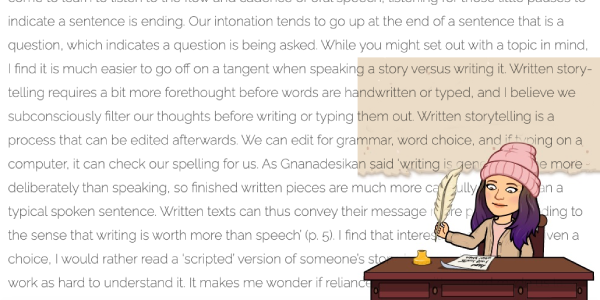
Link to Allison’s entry: https://blogs.ubc.ca/allisonjohnsonetec540/2021/01/31/task-3-voice-to-text-task/
Allison used Microsoft Word’s Dictate for her voice-to-text task. I have not used this before so it was interesting comparing her results with mine (I used the speech-to-text on iMessage to “text” the story to myself). I am surprised to see that her story isn’t too different from mine. I would’ve thought that Microsoft would have better technology as it is a word processor and theoretically, should it not be more powerful than an iPhone’s text message application? Like me, Allison also had a giant paragraph of text with no punctuation. Both her and my speech-to-text technology were able to identify numbers and use them correctly. The advantage Allison has with Word over my iMessage is that she can easily copy and paste her story right into WordPress, while I had to copy and paste multiple text messages into an email, check my email on my laptop, paste it over to WordPress, and strip it from any weird formatting it might’ve picked up along the way. I definitely will consider introducing Word’s Dictate to some of my reluctant writers in my class.
As with many classmates’ experiences with the speech-to-text task, the lack of grammar and punctuation affected greatly how much of our unscripted story made sense in the final product. Allison had the same connection I made to the reading; she noted Gnanadesikan’s (2011) observation of the written word being more deliberately crafted and edited, and thus more value is put into that over speech (p. 5). Allison poses an interest question at the end: She would’ve much rather read out a scripted story for ease of understanding. Has the reliance on the written word made us lazier?
As noted in our course notes, I don’t think we, as a literate post-print society, can ever truly understand how pre-literate societies understood truth and how their language shaped their knowledge. We do not rely on mere speech because we have a more reliable form of documentation for the truth. Rather than lazier, I think the written word has become something we rely on. Just as how technology has made some aspects of life easier (e.g., instant messaging), it doesn’t necessarily mean we are now lazier for not writing physical letters and mailing them. Life has changed, and so should our expectations. Our expectations for when we read something is that the information we take in makes sense. We also expect it to be less fallible than speech, where memories are coloured and shaped with time. Our tool, the written language, aids us and thus it is reasonable to expect our ‘tool’ to function the way it is supposed to. Like Allison, I too would’ve preferred to read a scripted story, but only because I knew that my oral storytelling is much weaker. Furthermore, I knew that the end goal of the task was to produce a ‘written’ piece of work, so reasonably, I had my doubts whether this other tool, speech, would be able to do the job well.
While writing this reflection, it led me to consider TED Talks. The most impactful speakers, topic aside, are the ones that engage me as if they were merely having a conversation with the audience. The less they appear rehearsed and scripted, the better their message is conveyed. Oral storytelling mirrors these characteristics. However, TED Talks are scripted and performed. Each speaker has carefully put together a presentation, most likely practised a lot, and has a monitor to prompt themselves during the Talk. On the TED website, a transcript is provided for each Talk. I am also reminded of my own e-Portfolio I created for the culmination of my MET program. I recorded each reflection but included a transcript for accessibility. However, the difference between mine and a TED Talk is that my transcripts were written first before I recorded the audio, whereas TED Talks’ transcripts are created after the fact. In both instances, the presence of a transcript and an audio/video recording, helps “outlast the words I speak” (Gnanadesikan, 2011, p. 3). Our reliance on the written word helps us be more accountable to what is being said. Recordings and transcripts let us analyze our thoughts, rather than leave them as mere memories. Because of all this, rather than lazy, I feel our reliance on the written word makes us more responsible for information we put out.
References
Gnanadesikan, A. E. (2011).“The First IT Revolution.” In The writing revolution: Cuneiform to the internet (Vol. 25). John Wiley & Sons (pp. 1-10).